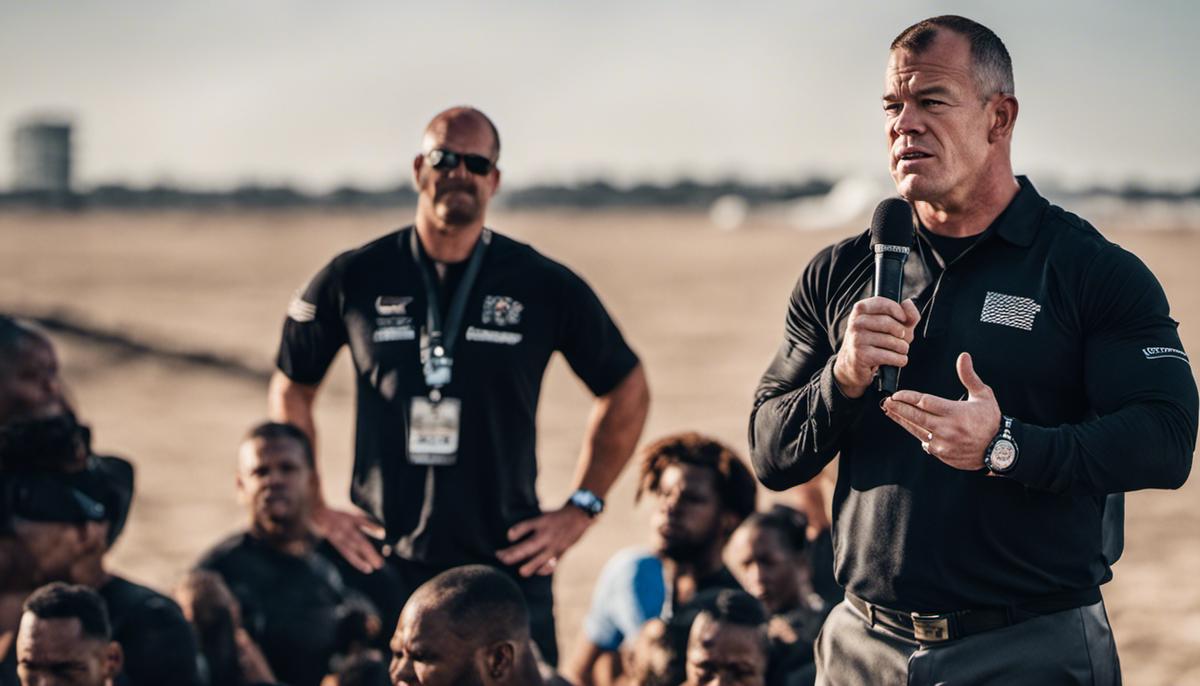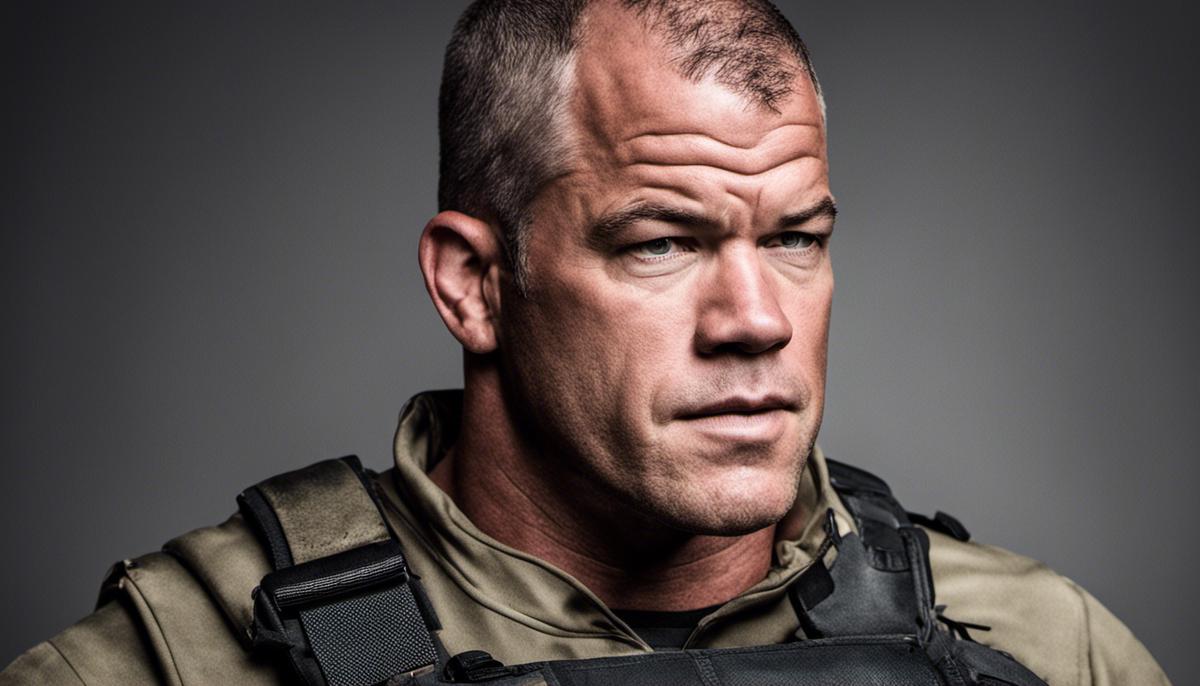In the demanding world of business leadership, Jocko Willink stands as an icon that merges military precision with corporate acumen. Renowned for his leadership acuity developed during his tenure as a Navy Seal commander, Willink’s philosophy charters a course for stellar achievement that transcends conventional leadership methods. The essence of Jocko’s teachings lies in harnessing the potential within and demonstrating unrivaled commitment to the mission. In this comprehensive exploration, we delve into the principles that have shaped Jocko Willink’s leadership style, reflect on their practical application, evaluate their limitations, and ponder real-life case studies.
Understanding Who Jocko Willink is
Jocko Willink’s Military Career
John Gretton “Jocko” Willink, a retired naval officer, has a remarkable military career centered around leadership and discipline. Willink served with the United States Navy SEALs for 20 years and rose through the ranks to become a highly decorated officer, receiving accolades such as the Silver Star and Bronze Star for exceptional service in the Iraq War. Jocko was part of SEAL Team Two before being appointed a commander for SEAL Team Three’s Task Unit Bruiser, a highly tactical unit deployed during the Iraq War.
The SEAL Leadership Training and Education
Working amid the crucible of battlefield conditions, Willink refined his leadership skills and harnessed them into principles that would later define his leadership training philosophy. The Navy SEAL teams are known for their rigorous training and education in leadership components such as situational awareness, decision-making under stress, persistence, and teamwork, skills that Willink seamlessly transferred to civilian leadership roles.
Achievements and Post-Military Career
After retiring from the military, Jocko co-founded Echelon Front, a premier leadership consulting firm that works with businesses and individuals to improve leadership skills, teamwork, and productivity. Jocko has also penned the best-selling books “Extreme Ownership: How U.S. Navy SEALs Lead and Win” and “Leadership Strategy and Tactics: Field Manual”, which offer insights into his leadership philosophy and practical advice on leadership.
Jocko Willink’s Key Leadership Skills
Willink’s leadership philosophy hinges on several key skills developed during his military career. Among them, Extreme Ownership stands out as the bedrock principle. This concept implies that leaders must take complete responsibility for their team’s failures as well as successes, a principle Willink practiced and implemented during his time in the military.
Embracing humility, another important aspect of Jocko’s leadership, ensures that leaders are open to feedback and willing to improve. His concept of ‘Leading Up the Chain of Command’ allows subordinates to effectively communicate with their superiors and influence decision-making processes. Discipline, a vital lesson from his SEAL training, is also a cornerstone of his leadership style.
Deciphering Jocko Willink’s Unique Leadership Approach
Jocko Willink’s leadership approach is a complex blend of his military training and real-world experience, translated seamlessly into the high-stakes world of business. His method represents the quintessence of stress-induced decision-making, strategic planning, and effective team leadership, elements that are essential in both the battlefield and the boardroom. The key to leveraging his approach lies in understanding his background and unique philosophy, which can then be applied personally to bolster one’s own leadership style.

Jocko Willink’s Principles of Leadership
The Power of Extreme Ownership
At the heart of Jocko Willink’s leadership philosophy lies a critical principle – Extreme Ownership. This principle implies complete responsibility for everything that falls within one’s purview, negating the need for finger-pointing or excuse making. According to Willink, true leadership cannot exist without acknowledging and accepting this comprehensive ownership, especially during failures and shortcomings. This belief is deeply rooted in his time as a U.S. Navy SEAL, particularly highlighted during a sobering mission that ended in tragedy while under his command, for which he unflinchingly took full responsibility.
The Dichotomy of Leadership
The Dichotomy of Leadership refers to a set of contradictory traits that are required in a leader. Willink emphasizes the necessity for a balance between detailed planning and dynamic decision-making; firmness and empathy; and guidance and delegation. He is cautionary towards becoming too far entrenched in any one trait, advising that leaders need to harmonize conflicting ideas and even embody such contradictions themselves to be successful. For instance, a leader should be aggressive but not reckless, and disciplined but not rigid.
Leading From the Front
Leading from the front, another core principal of Willink’s philosophy, is about setting an example and demonstrating what is expected from everyone else. The philosophy is based on the premise that actions speak louder than words, and a leader’s role is to show how tasks should be done. Willink, having led high-stress operations as a Navy SEAL, advises leaders to lead the charge, exemplifying the behavior necessary to achieve success at every level.
Discipline Equals Freedom
Willink is known for his mantra of “Discipline Equals Freedom”. This means that by imposing self-discipline and structure, you can gain more control over your life and thereby, achieve freedom. In the context of leadership, it means giving clarity and structure to your team, reducing ambiguity and thus providing them the freedom to manoeuvre within set boundaries.
Accountability and Humility
Accountability and humility are crucial tenets of Willink’s leadership approach. Willing asserts that leaders should avoid ego-driven decisions and instead make decisions considering the greater good. By promoting accountability, he mandates that leaders should admit their mistakes, learn from them, and use the lessons to improve. His philosophy advises leaders to be humble, admitting that they don’t know everything, opening up the gauge for continuous learning and improvement.
Embracing Decentralized Command
A core principle of Jocko Willink’s leadership model, developed from high-stakes military operations, is decentralized command. This concept empowers every team member by providing them a level of autonomy in executing their duties. By delegating decision-making responsibilities to lower levels in the chain of command, leaders are able to enhance team effectiveness, as well as free themselves up to concentrate on strategic, high-level decisions.

Practical Application of Willink’s Leadership Theories
Digging Deeper into Jocko Willink’s Leadership Approach
Jocko Willink isn’t just a retired United States Navy SEAL commander; he’s a best-selling author, a renowned leadership instructor, and an inspiring figure. His leadership style is esteemed for its stringent discipline and heightened sense of accountability. These qualities are more than just personal traits; they’ve been tested and validated in real-world military scenarios. You can find these principles explained and advocated for in his top-selling book, Extreme Ownership: How U.S. Navy SEALs Lead and Win.
One of the key principles of Willink’s leadership theories is the concept of “Extreme Ownership.”
This principle embodies the idea that leaders should take full responsibility for the success and failure of their teams. Leaders should also promote a culture of accountability where every team member is encouraged to take responsibility for their actions and decisions.
Applying “Extreme Ownership” in Professional and Personal contexts
Willink’s “Extreme Ownership” can be applied in everyday leadership situations in professional and personal contexts. In a professional setting, leaders can apply this theory by accepting responsibility for the performance of their teams rather than blaming external circumstances or individuals for failures. They need to lead by example, showing their teams that it is okay to make mistakes as long as one owns up to them and learns from them.
In a personal context, the application of Extreme Ownership starts with self-leadership. This involves taking responsibility for one’s actions, decisions, and their consequences. It means recognizing that you have control over your reactions and responses to different situations.
Practical Leadership Principles from Jocko Willink Books
In his book, Leadership Strategy and Tactics: Field Manual, Willink expands on his principles of leadership with practical tactics for implementation. This includes “Decentralized Command,” which suggests that everyone on the team needs to understand the mission and take responsibility for their part in it. This promotes team autonomy and responsibility.
Willink also touches the principle of “Leading Up the Chain of Command,” which challenges leaders to effectively communicate with and influence their superiors. This is a crucial leadership skill in any organizational setting.
Another important principle discussed in the book is “Plan.” According to Willink, leaders must plan for every possible situation and have a clear understanding of the end goal. This mitigates the impact of potential obstacles and ensures the team stays focused and cohesive in their efforts to achieve the goal.
Practical Implementation of Jocko Willink’s Leadership Principles
The tenets of Jocko Willink’s leadership principles have found practical applications across various real-world situations. Consider the scenario of a project team failing to meet its deadline. Assuming Extreme Ownership, the project manager does not point fingers but acknowledges the leadership shortcomings contributing to the delay, and seeks ways to ameliorate them.
In a similar vein, a mother instilling the values of accountability and responsibility in her child is also an application of Extreme Ownership. She underlines the idea that our actions have consequences that we must be ready to accept.
These instances illustrate the universally applicable and adaptable nature of Jocko Willink’s leadership principles. They demonstrate how these principles can be used distinctly across various life scenarios to improve both personal and professional development.

Critics and Limitations of Jocko Willink’s Approach
Potential Drawbacks of Jocko Willink’s Leadership Model
Despite its effectiveness, Jocko Willink’s leadership approach is often criticized for its perceived lack of universal applicability. While his principles, championing discipline, accountability, responsibility, and team-first mentality, function effectively within military parameters, they might not resonate similarly in distinct professional or societal environments. Creative industries, for example, might flourish more under an existential and flexible leadership style that encourages innovation.
Furthermore, his advocacy of Extreme Ownership can put immense pressure on individuals, as this philosophy insists on leaders taking absolute responsibility for their actions and their outcomes. This demand could result in overly stressed leaders who struggle to lead effectively during demanding circumstances.
Willink’s philosophy can also undermine the importance of recognizing and comprehending emotions, potentially overlooking emotional intelligence, an essential trait for leadership. While maintaining discipline and emotional control is paramount in a combat situation, acknowledging and empathizing with a team’s emotional state in a civilian environment can lead to stronger relationships and improved team synergy.
Practical Implementation and Challenges
The practical implementation of Jocko Willink’s leadership philosophy may present significant challenges. Especially in organizational settings where an established leadership style exists, transitioning to the extreme ownership model may lead to resistance and friction within the team. The requirement of a cultural shift towards taking greater individual responsibility might take considerable time and effort, which can be challenging.
Extreme ownership can also be viewed as a double-edged sword. While it has the potential to greatly empower leaders, it can also potentially lead to the scapegoating of individuals when things go wrong. This risks creating a blame culture rather than a culture of learning from failures and mistakes.
Contrasting Views from Leadership Experts
Opposing views from leadership experts argue for a more balanced approach to leadership, one that also emphasizes empathy, collaboration, and shared vision. These critics emphasize that leadership should adapt to ever-changing environments, needs, and context rather than sticking rigidly to a one-size-fits-all approach.
An effective leader, according to these experts, is one who can switch between different leadership styles and adapt according to the requirements of the situation. While they agree with Willink’s assertion that a leader should take responsibility, they also advocate for the idea that leadership is a collective journey, one that encourages a shared sense of ownership and team collaboration.
Comprehending Jocko Willink’s Principles
In evaluating Jocko Willink’s leadership philosophy, it is crucial to note that while it possesses its distinctive merit and can prove successful in certain situations, some critics propose a more encompassing and adaptive leadership approach could offer greater advantages, especially in a diverse and perpetually evolving work setting. It is essential to acknowledge that effective leadership often hinges on situational context, team dynamics, and the capability of the leader to navigate complex scenarios skillfully.

Case Studies of Jocko Willink’s Leadership Methodology
Case Study Analysis: Echelon Front
Our first demonstration of Willink’s leadership doctrine in application is Echelon Front, a highly praised leadership consulting company co-founded by Jocko Willink himself. The foundation of this company is rooted in Willink’s “Extreme Ownership” philosophy, which demands that leaders must bear complete responsibility for all events occurring under their command.
Inculcating this principle required a fundamental cultural transformation within the company. The leaders were encouraged to stop pointing fingers at their team for failures and instead begin embracing complete responsibility for the results. This challenge not only involved fostering this fresh perspective among the leaders but also motivated team members to acknowledge their errors and recognize their impact on the overall outcome.
The aftermath of this transformation was impressive. The company witnessed an uplift in productivity, efficiency, and the overall morale of the team. Leaders became more accountable, team members felt more involved and appreciated, and the workplace evolved into a more unified and effective unit. This case study thereby stands as a testament to the potency of Willink’s Extreme Ownership philosophy and his prowess as a leadership expert.
Case Study 2: SEAL Team Three
Jocko Willink’s leadership principles were also put to the test during his service as the Commander of SEAL Team Three’s Task Unit Bruiser during the battle of Ramadi. The situation was critical and chaotic, making it a challenging environment to lead in.
Despite the harsh conditions, Willink successfully applied his principle of “Simplicity in Planning”. He encouraged his team to create simple, straightforward strategies which avoided overcomplication. This approach made his orders understandable to all members of the unit, enabling effective execution of the plans.
Under Willink’s leadership, SEAL Team Three became the most highly decorated Special Operations Unit of the Iraq War. They achieved numerous successes on the battleground and credited many of their victories to Willink’s clear and simple strategies. The results solidify that simplicity in planning serves well in chaotic and stressful situations, proving yet another of Willink’s leadership principles.
Case Study 3: Manufacturing Industry
Jocko Willink’s “Decentralized Command” principle was applied successfully within a large manufacturing organization facing production delays. Instead of having one central command, the company decentralized their decision-making, allowing department leaders and team leads to make decisions.
Implementing this principle was challenging, as it required trust in the employees’ ability to make the right decisions, ensuring that everyone understood the company’s mission, and aligning everyone’s actions accordingly.
However, the company saw significant improvements in their production times, a decrease in backlog, and increased satisfaction amongst employees. This case underpins Willink’s principle that empowering others to lead can create a more efficient and successful organization.

The dynamic approach to leadership promoted by Jocko Willink offers astute insights that are an asset to anyone in a leadership position. While acknowledging criticisms and addressing the limitations of Willink’s theories is germane to achieving a balanced perspective, it is evident that the virtues of discipline, accountability, humility, and the emphasis on a decentralized command hold considerable merit. Backed by the testimony of organizations that have reaped the rewards of implementing Jocko’s leadership principles, it becomes clear that Willink’s methodology is not just applicable in a war zone, but in any challenge-ridden environment, it becomes a beacon guiding towards success. Leadership, as Jocko Willink interprets it, is not an imposition of power but a demonstration of responsibility – a lesson for the leaders of today and tomorrow.
